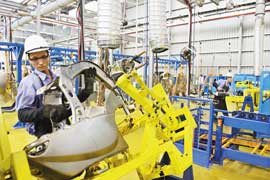
| A cautious outlook to cool hot FDI targets | |
Vietnam will make cautious foreign direct investment forecasts until the end of next year on the back of international analysts’ predictions that a rebound could be postponed until 2011. Initial forecasts, which were made at a Ministry of Planning and Investment (MPI) meeting last week to discuss Vietnam’s foreign direct investment (FDI) scenarios in 2009 and 2010, put the nation’s registered FDI funds across 2009 at around $20 billion, a sharp decline of 70 per cent in comparison with last year’s figure. At the same time, the nation will be able to reach $9-$10 billion of disbursed FDI capital, equal to that of 2008. Meanwhile, the early scenario of Vietnam’s FDI attraction next year would see 10 per cent growth on this year’s projections of registered and disbursed funds. A MPI senior official, who declined to be named, said the forecasts accurately reflected the current situation, where a lot of FDI projects suffered great delays amid increased competition from regional rivals to attract FDI. “We have heard that neighbouring countries are trying to lure investors who had had large-scale investment projects licenced in Vietnam by providing the investors with much better incentives. I’m afraid that these investors, like the world’s leading IT contractors Compal and Foxconn, will delay their projects in Vietnam,” the official said. In 2007, Compal Electronics, the globe’s second largest contract laptop PC maker, received an investment certificate to build a $500 million facility in northern Vietnam with a monthly production output of 500,000 laptops in the first quarter of this year. Two years ago, Foxconn announced that it would pump more than $5 billion into Vietnam within the next five years to make it one of the largest manufacturing bases in the world. “We have to accept the alarming impacts of the global economic crisis on Vietnam’s FDI attraction. Our statistics revealed that industrial parks of at least 20 provinces in the country did not have any new FDI licences in the first seven months of this year,” Tran Hong Ky, deputy director of the MPI’s Department for Economic Zones Management, said. He referred to an almost 40 per cent decline year-on-year in FDI inflows into the country’s industrial parks between January and July of this year, down to $1.6 billion. Vietnam’s newly registered and expanded FDI funds for the first seven months of this year dropped sharply by 80 per cent year-on-year, to just $10.1 billion at the end of July, according to the MPI’s Foreign Investment Agency. Meanwhile, the nation’s disbursed funds between January and July saw a 22 per cent decline from last year’s corresponding period, down to around $4.6 billion. Declining disbursed FDI funds in Vietnam were the result of various FDI projects, which were licenced in previous years and could not get off the ground as a result of the global crisis, which forced international investors to down-scale their investment expansion strategies worldwide. Noticeably, large-scale projects like a $9.8 billion steel-making facility in the southern Ninh Thuan province and a $1.2 billion software park in Ho Chi Minh City were facing licence withdrawals. Together with the slow progress of licenced FDI projects, the MPI was also concerned about Vietnam’s loss of FDI projects in the near future, in the face of the nation’s worse-ranking in the recent international community’s world investment prospects surveys. The World Investment Prospects Survey 2009-2011, released by the United Nations Conference on Trade and Development (UNCTAD) in July, ranked Vietnam number 11th on the list of favourable countries for FDI in the 2009-2011 period, compared to its sixth position in UNCTAD’s 2008-2010 survey. The study, surveying representatives from more than 240 of the largest non-financial transnational companies (TNCs), indicated that Vietnam remained an attractive destination of developing economies in Asia, but not of TNCs from North America, like the US and Canada. | |
| VnInfoGate.Com |
